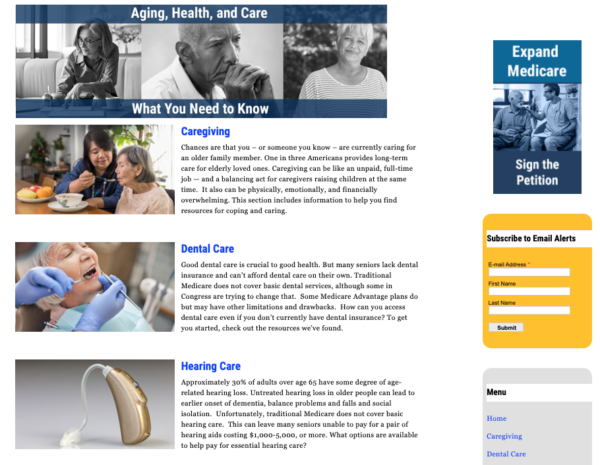
Classic movie star Mae West famously said, “Getting old isn’t for the faint of heart.” Most older people probably know what she means. Of course, aging can also be a rewarding time of pursuing hobbies and interests, travel and discovery, and enjoying grandchildren, among other things. But the “not for the faint of heart” part rings particularly true when it comes to participating in our senior health care system.
Unlike many other Western nations, most older Americans are confronted by a byzantine network of programs that aren’t always easy to navigate (including Medicare, Medigap, Medicare Advantage, Medicaid, the Affordable Care Act, private insurance, and more.) And then there are the coverage gaps where we expect seniors – or their families – to shoulder an outsize portion of the added financial costs. This can include things like medical co-pays, adult day care, dental care or eyeglasses. How many spouses and families are prepared to handle caregiving duties or pay these expenses? It can be overwhelming.
Many people are also unaware that traditional Medicare does not cover routine hearing, dental, and vision care. That can come as a shock, especially when a senior needs a new pair of eyeglasses, hearing aids, or a dental implant. Even the average cost of frames and lenses ($350) can be a strain on seniors’ finances, let alone more than $2,000 for hearing aids or dental surgery.
Understanding how our system of aging services works, what your financially responsibilities are, where to access help, and what you need to know is critical to a smoother landing in the aging zone. For instance, if you miss a Medicare enrollment deadline, you could end up paying higher premiums. If a senior can’t drive but needs to get to a doctor’s appointment, is there help for that? What if an older loved one is not getting proper nutrition – or doesn’t seem to be hearing as well as they used to? There are so many situations that may need attention. But where to turn? And, more importantly, how to pay for it if the senior is living on a fixed income?
Planning and preparation are key. As we age, we need to be knowledgeable about health and care services and programs before something goes wrong. That’s why, along with advocating full-time for Medicare and Medicaid expansion, we have created a resource section on our website where older adults and their families can learn crucial information – and find suggestions for help. The resource is called Aging, Health, and Care: What You Need to Know.

The resource is organized into topics for easy browsing, so visitors can dive into whichever section is most relevant to them. Some of the most popular topics include:
Visitors to this site will find consumer-friendly information and articles, about these and other topics. Seniors and family members with questions like…
“How much am I going to have to pay for health care? What if I have to stop driving? If I need long-term care, what are my options? How can I avoid being a burden to my children, who have struggles and challenges of their own?”
… can take the first steps toward gaining useful knowledge, in order to be as prepared as possible when they need it. Visitors can also sign a petition to Congress demanding Medicare coverage for dental and hearing care. Simply put, Aging, Health and Care: What You Need to Know is a great first stop on the road to learning – and self-empowerment – for older Americans.


